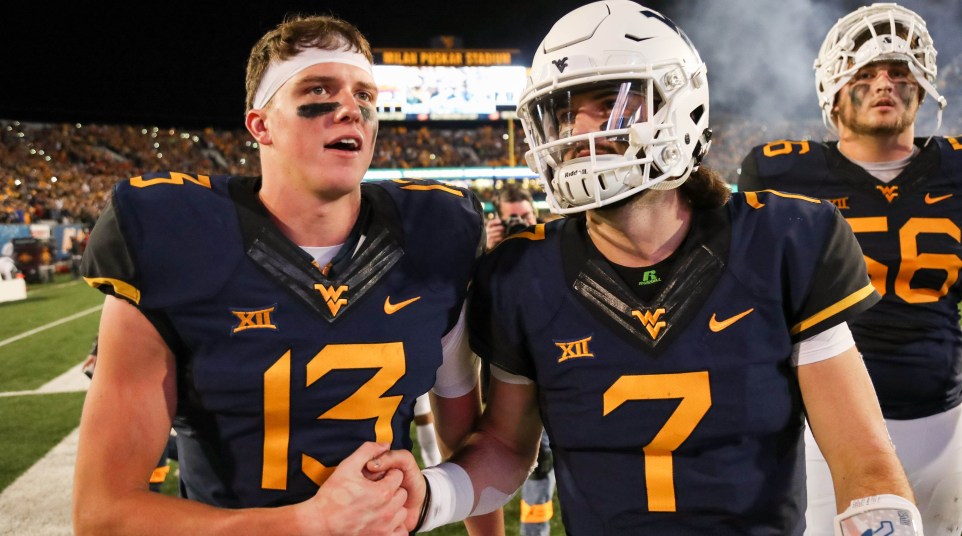
Tennessee football: Stopping Will Grier will be a monumental challenge Saturday
One would be hard-pressed to find an objective analyst who doesn’t think West Virginia’s offense is going to have a good day against Tennessee on Saturday. Some even think it could monumentally bad for the Vols. There is plenty of reason to think so.
The Mountaineers will be led by quarterback Will Grier, the ex-Gator who is considered a strong Heisman candidate and has been named to several preseason All-American lists, including the Associated Press. The Mountaineers also have a fantastic set of big receivers, led by another preseason AP All-American, David Sills (pictured above, with Grier). Then, there’s the offensive philosophy in Morgantown. Led by head coach Dana Holgorsen, West Virginia wants to pressure defenses with an up-tempo passing game with multiple formations and a wide array of plays. It has proven effective for more than a decade as Holgorsen has headed up offenses at Oklahoma State, Houston and Texas Tech.
As for the Vols, they probably don’t have the manpower to match West Virginia on Saturday. The first-year head coach is trying to rebuild a team that was historically bad last season by finishing 4-8. Pruitt doesn’t have the type of defensive backs he would prefer to slow down the Mountaineers. The Vols are much smaller in the secondary than they will be once Pruitt is able to reshape UT’s personnel.
The personnel matchups aren’t the only issue. Statistics don’t do much to swell optimism among the Vols’ faithful either. West Virginia was 13th in the nation in passing yards per game last season, averaging 309 yards.
Going on the road didn’t slow down the Mountaineers much, either. They were 16th in passing offense in road/neutral site games last season, at 299 yards per game. Grier and the Mountaineers were also at their best during the beginning of the season. In August and September, they averaged 363 yards passing per game.
After the fast start, defenses began to catch up — just a little bit. Then Grier suffered a season-ending finger injury on his throwing hand against Texas in the 11th game. That was about the only thing that could slow down the Mountaineers’ passing attack.
Still, Grier finished the season with 3,490 yards and 34 TD passes — finishing in the top 20 nationally in both. In yards per game, he was No. 8 nationally, the same ranking he held for TD passes.
So how does UT overcome such a vaunted passing attack? First, the Vols have to be far more disciplined than they were last season. Former players, such as media analyst Fred White, told Saturday Down South that he saw the Vols lined up in the wrong position far too often last season. If that happens against West Virginia, Grier will ensure it will be a long day for the Vols. That, however, doesn’t seem likely with a detail-oriented coach like Pruitt at the helm.
Pruitt is known for coaching defensive backs. He has done so throughout his career and excelled at it. If the Vols get beat downfield, it won’t likely be because they are ill-prepared. Pruitt is also known for keeping things simple from a fundamental standpoint. That should help the Vols not overthink things. However, Pruitt has also coached multiple coverage schemes. That will be mandatory to keep West Virginia off balance.
Another key for the Vols is limiting Sills. When he was in seventh grade, Sills was a highly rated quarterback prospect who committed to former UT coach Lane Kiffin when he was the head coach at Southern California. Sills knows how to read defenses thanks to his time as a signal caller. He also has size. Sills is 6-4 and just over 200 pounds. That’s a tough matchup. That was evident last season when Sills caught 60 passes for 980 yards. Many have projected him as a first-round pick in the 2019 NFL Draft.
Wanna hear something else scary? Sills isn’t even West Virginia’s leading returning receiver. Gary Jennings caught 97 passes for 1,096 yards last season. Marcus Simms, who is also projected to be in the starting lineup Saturday, caught 35 passes for 663 last season. The depth behind them is solid as well.
UT’s offense might actually determine just how many passing yards the Vols give up. If the Vols can control the clock, then they can limit Grier’s opportunities to do damage and keep UT’s defense fresh.
It’s not imperative that the Vols control West Virginia’s passing game to beat the Mountaineers in Charlotte, N.C. UT actually won the game in which they gave up the most yards in school history. It occurred in 2012. Troy rang up 496 passing yards, but the Vols still won 55-48. However, getting in a shootout doesn’t seem like the best chance to win this time around. It seems like a way to get embarrassed.
